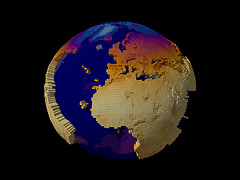 With BP’s leaky well in the Gulf of Mexico barely capped and Tony Hayward ousted, Libya will allow BP to commence drilling deep off the coast of the Mediterranean Sea [image via arenamontanus]
With BP’s leaky well in the Gulf of Mexico barely capped and Tony Hayward ousted, Libya will allow BP to commence drilling deep off the coast of the Mediterranean Sea [image via arenamontanus]
While the BP oil spill off the Gulf of Mexico drew worldwide consternation, inspiring an ardent campaign to quit our dependence on oil, the Mediterranean Sea’s Deepwater Horizon goes largely unnoticed.
Though no singular spill so spectacular has occurred, the Financial Times reports that the hundreds of annual spills in the Mediterranean add up to the equivalent. Even so, beyond the reach of potent environmental watchdogs and beyond the scrutiny of the American press, Libya is ready to harbor BP’s dangerous deepwater drills in the Mediterranean.
Sealing the deal
The $900 million deal was signed in 2007 by BP’s now former Chief Executive Tony Hayward, who was recently dethroned for his handling of the Gulf of Mexico oil disaster.
“Drilling will start within a few weeks,” BP confirmed.
President Obama issued a moratorium against deep-water drilling in the United States, and Günther Oettinger, Europe’s energy commissioner, suggested a similar moratorium on deep-water drilling in European Union waters. The Mediterranean states, according FT, ignored his pleas.
How deep do we need to dig?
“At 1,700 metres below sea-level in Libya’s Gulf of Sirte, the well will be 200 metres deeper than the Macondo well in the Gulf of Mexico,” according to Guy Dinmore and Eleonora de Sabata.
And Libya is not the only country eager to drill deep off-shore, despite its obvious perils. Dinmore and de Sabata report that Diamond Offshore is moving its drilling equipment to Egypt, Australia’s APX is poised to drill between Tunisia and Italy, and Shell will settle in Western Sicily. Italy, meanwhile, has signed 21 new exploration agreements.
Semi-enclosed as it is, mixing with the Atlantic only once every 90 years, the Mediterranean Sea’s ecosystem is extremely fragile. In addition to frequent oil spills, development, urbanization, and land-based sources of pollution such as industry, human sewage and agriculture also contribute to its degradation.
Which brings us back to the question that we have asked before: are our leaders taking climate change seriously?
More Oil Spill Stories Than We Care To Talk About:
PetroGulf Misr Denies Responsibility For Red Sea Oil Spill
Red Sea Spill Causes Oil Company Stocks to Drop
Don’t Cry Over Spilt Oil? Egypt Gov Says Red Sea Spill is from Old Oil



